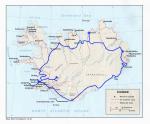Before going to China, Elínborg and I read Lost On Planet China by J. Maarten Troost to prepare us for what was to come. We both really liked the book, it was both entertaining and interesting and a good preparation for our trip. You can see my previous review here.
First I would like to restate that reading the book was a great preparation to visiting China. What the book did was lowering almost all of my expectations of China. The book displayed the people as rude and difficult and I found the author, especially towards the beginning, to a bit like a baby that has leaving home for the first time without the knowledge that other people might be different from him self.
I can see now, after travelling through China for three weeks, that the author obviously chose to exaggerate quite a bit to be create a more compelling story. After all, fiction is so much more exciting than ordinary life, so who can really blame him?
To the author’s defense I’ve read that before the Olympics, Chinese authorities campaigned for a better behavior from Chinese citizens, hanging up signs and handing out pamphlets – no spitting on the street and so on – so that might contribute to the discrepancy between our experience and his.
Of course we didn’t travel as extensively as Mr. Troost but I don’t think that really changes much. As I’ve said before he seemed to like China more and more each day. We definitely loved China and the Chinese people (as you can see here) the culture and the many historic sites in China – even though we thought that quite many of them were way over hyped.
Just to summarize, I would again highly recommend this book to anyone that intends to visit China. It is highly entertaining and if nothing else, at least it will lower your expectations. Like someone told me – happiness is nothing more than expectation management!








